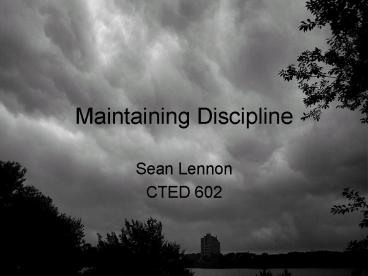Maintaining Discipline - PowerPoint PPT Presentation
1 / 17
Title:
Maintaining Discipline
Description:
Utilizing consequences/rules ill suited for the situation. Punishing the ... Zeal & exuberance. If teacher is enthused so will the student. It is contagious ... – PowerPoint PPT presentation
Number of Views:1624
Avg rating:3.0/5.0
Title: Maintaining Discipline
1
Maintaining Discipline
- Sean Lennon
- CTED 602
2
Discipline Problems
- Defined by teachers
- Inappropriate behaviors
- Disruption
- Off task behaviors
- Not interpreted through student perceptions
- Not exactly the same as teachers
Tulley Chui (1997)
3
Discipline Problems
- Student teacher perception
- Different types
- Disruption
- Defiance
- Aggression
- Incomplete work
- Miscellaneous
Tulley Chui (1997)
4
Discipline Problems
- Not always about the student!
- Conditions that exacerbate discipline
problems - Student and class
- Authoritarian/punitive rules
- Student/class needs not met
- Teacher variables
Logan, 2003
5
Teacher Variables
- Inexperience
- Lack of communicating rules
- Inconsistent expectations
- Reliability on central office
- Inappropriate planning/time management
Edwards, 2000
6
Teacher Variables
- Over-reacting
- Respond to behaviors aggressively
- Yell or rant to class
- Using severe or harsh consequences
- Punishment doesnt fit the crime
- Inflame class situation instead of
reducing it
Spitalli, 2005
7
Teacher Variables
- Under-reacting
- Strive for harmony at all costs
- Ignore infractions/behaviors
- Hope it will go away
- Encourages further behavior
Tulley Chui, 1998
8
Teacher Variables
- Ineffective/wrong discipline techniques
- Utilizing consequences/rules ill
suited for the situation - Punishing the whole class
- Bullying/intimidation
- Coercion/threats
- Using grades as a punishment
Spitalli, 2005
9
Reducing DisciplineIssues
- Teacher actions/responsibility
- Single greatest variable
- Teacher
- Student
- Rest of the class
- Only true variable a teacher can
modify
10
Reducing DisciplineIssues
- Positive/nurturing environment
- Classroom and teacher should be
- Comfortable for students
- Conducive for learning
- Open for frank/honest discussions
- Show empathy/rapport
Stronge Hindman, 2003
11
Reducing DisciplineIssues
- Clear expectations
- Set rules and parameters
- Discuss on first day
- Post in class for all to see
- Model
- Dont be afraid to use consequence
- Remind on a continuous basis
Carbone, 1999
12
Reducing DisciplineIssues
- Keep them busy!
- No time for misbehavior
- Organization!
- Keep records
- Grade everything
- Routine!
- Create a class routine and stick with it!
Stronge Hindman, 2003
13
Reducing DisciplineIssues
- Personality!
- Teaching is science and art
- Zeal exuberance
- If teacher is enthused so will the
student - It is contagious
- Makes learning interesting/fun
14
Conclusion
- Classroom management is learned through
experience - Some factors make a difference
- Avoid over-restrictive rules
- Avoid unrealistic/harsh consequences
- Keep your cool!
- How a teacher reacts makes a world of difference
- Use busy work and routine
15
References
- Carbone, E. (1999). Students Behaving Badly
in Large Classes. New Directions for
Teaching and Learning. 77, Pg 35.
Retrieved February 6, 2005 from ERIC. - Edwards, C.H. (2000). The Moral Dimensions of
Teaching And Classroom Discipline. American
Secondary Education, 28, Pg 20. Retrieved
February 6, 2005 from ProQuest database
16
References
- Logan, J.G. (2003). Classroom Management
Techniques, Policies, Procedures and
Programs to Ensure That Discipline Rules
in Your Classroom. Retrieved February 2
from ERIC. - Spitalli, S.J. (2005) The DONTS of Student
Discipline. The Education Digest, 70, Pg 28.
Retrieved February 6, 2005 from ProQuest
database.
17
References
- Stronge, J.H., Tucker, P. D., Hindman, J.L.
(2003) Handbook for Qualities of Effective
Teachers. Association for Supervision
and Curriculum (chap.3). Retrieved
January 31, 2005 - Tulley, M. Chui, L. H. (1998). Childrens
Perceptions of the Effectiveness of Classroom
Discipline Techniques. Journal of Instructional
Psychology, 25. Retrieved February 4, 2005 from
Academic Search Premier database































